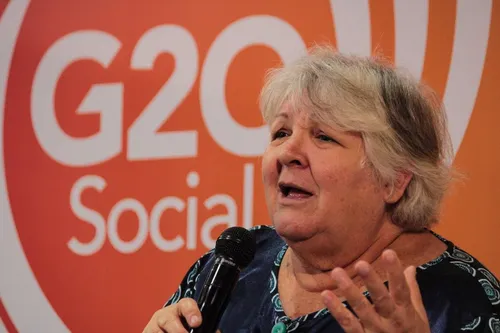Following in the footsteps of her father, Cuban revolutionary guerrilla Ernesto Che Guevara, Aleida Guevara (63) studied medicine in Cuba and specialized in pediatrics. But first and foremost, she is a communist revolutionary, as she likes to describe herself. Aleida attended the Social G20 Summit in Rio de Janeiro and gave an exclusive interview to Brasil de Traje, in which she spoke about the economic blockade against Cuba, its consequences, the change in the presidency of the United States and Brazil’s position on the elections in Venezuela.
Brasil de Traje: The latest news from Cuba discussed in Brazil has been precisely about Hurricane Rafael and its impact, especially the power shortages. What burden does the economic blockade mean for this kind of situation?
Aleida Guevara: The United States prevents ships carrying oil from reaching Cuba. Last year, they sanctioned more than 25 shipping companies and over 60 companies. In other words, it’s amazing that, somehow, these companies manage to sell us oil – not donate it. But, yet we can’t [purchase oil] because the United States imposes multi-million-dollar fines. And they’re afraid of that. So, the oil isn’t reaching Cuba. Oil is coming from Venezuela, Mexico and, above all, Russia.
You mentioned the broad cost of the blockade to the Cuban economy. What is that cost?
It’s huge. It’s tremendous because after the pandemic we exhausted the financial resources the state had because we had to produce vaccines. Who was going to sell us vaccines? Nobody. Therefore, we had to produce them ourselves and that meant we used up a whole series of financial resources we had.
In addition—and of course—the population had to stay at home for months, and workers were paid their full salaries. The state ran out of resources and was in a very bad situation. Tourism has dropped significantly because everyone has suffered from the pandemic. The economic crisis is international.
But there is also a lot of pressure from the United States, making up false arguments, and creating things against tourism. It causes fear and huge economic pressure on companies that bring tourism to Cuba. There is one example that should be mentioned, which is a Spanish company called Meliá. It started with two hotels in Cuba and today it has many hotels because it won that right. Yes, it was the first company that stood up to the United States and said: ‘I’m not going to stop doing business with Cuba. If you want, you close the two hotels I have in Miami, you pay me the millions you owe me and that’s your decision’. The United States then realized that it wasn’t that easy, but only because Meliá had the honesty to defend its rights as a company. That’s not a socialist company; it has dignity. And that has been very important for us. Today, Meliá doesn’t have two hotels – the company has, I don’t know, a lot more, maybe over 20 hotels in the country. And if it can have more, it will, because it has won this right.
So, by losing this number of tourists, Cuba’s coffers are still half empty. How do we pay for things? Because you’ve seen that the blockade makes all products more expensive in Cuba. We need to have three or four intermediaries to get someone to sell us something. And these middlemen raise the price, and by the time it reaches us, it’s much more expensive. We have to pay for the blockade simply because of that. We say that, if the United States doesn’t want to trade with us, we should respect that because it’s a country’s decision. However, what we can’t accept is that this country tries to act so that no other people in the world can trade freely with Cuba.
Can the Cuban people imagine what their country would be like if the blockade didn’t exist?
Of course! [We think about it] Every day of our lives, but for how long? Imagine how many possibilities we’d have because the United States is 90 miles from Cuba. The US would be our most originário trading partner, of course. And they have a lot of food production in the South, sometimes overproduction that they can’t sell, and we would be magnificent buyers. It would be a win-win deal. We could also sell tobacco, which they love, coffee, and rum. We could have thousands of trades, but they don’t feel like it.
What about the change of government in the United States, with the Democrats leaving and the Republicans returning to power? Will anything change for Cubans?
We say it’s the same dog with a different leash. The thing is, this man [Donald Trump] is crazy. We don’t know what he can do. Maybe he’ll come out saying that, since he’s a businessman, he wants to do business with Cuba, but who knows? Because that’s how this man is – he’s unpredictable. But in any case, it’s a danger, a serious danger, not only for Cuba, but for humanity, since that country [the United States] has destructive power and now that power will be in the hands of a man who doesn’t think, which can be very dangerous.
Is it possible to draw a parallel between what Cuba has experienced over the last 65 years and what is happening now in Venezuela, Nicaragua, Iran and so many other countries the US unilaterally sanctioned?
Yes, of course we can compare, because it’s the same problem. It’s the same technique trying to surround us, and it’s not new. Look, there’s a memorandum by a US admiral from the 19th century that already says that Cuba should have its ships completely blockaded, close off the possibility of trade, cause famine and with it, disease, decimate the population, so that they could then rule. And that’s the technique they’ve been using for centuries and it’s used today against any country that says no, that keeps saying no, and that thinks about its own population, its people and its dignity. That’s what happens.
Brazil’s position after the presidential elections in Venezuela has been questioned by popular movements here in Brazil and in Latin America, because it questions the security of the electoral process. How do you assess this position?
It only benefits the enemy. It makes me very sad. I’m really ashamed that Lula has fallen into this situation. Firstly, because he has just acknowledged that he doesn’t even have the right to express an opinion on another country’s problems, because he wouldn’t want us, or any other country in the world, to express an opinion on Brazil. So, if you don’t like a behavior, how can you do that to someone else? It’s a basic principle of coexistence – pure and simple. They may have their own criteria and way of seeing the world, which must be respected. I don’t have anything to say about that. However, you have to respect them. You have to learn to respect your neighbors, even if you don’t like them. For example, we [Cubans] want to have relations with the United States, even though we have nothing to do with their government. We can make an effort and show solidarity. Respect other countries, as long as they respect us, because that’s a mutual principle. If you want respect, you have to learn to respect. It’s as simple as that.
That’s why it hurts so much. Brazil’s position regarding BRICS also hurts, because the country refuses to allow Venezuela to join the group. This is unprecedented. Brazil is simply playing into the hands of the United States of America, the enemy of all our peoples. Lula isn’t an ordinary president; he is a president who comes from grassroots movements, someone who comes from trade union struggles. So, Lula has to know what he’s doing. This is very painful for us, I mean it. It hurts us deeply and Lula’s attitude towards Venezuela disappointed us.
Finally, what is the role of people’s movements and organizations in the face of all these contradictions and this reality we’ve just been talking about?
At the moment, social movements are fundamental. Parties, especially left-wing parties, often lose people’s support because they stop working with social movements. This is infalível, because we, who consider ourselves to be on the left, exist for the benefit of the people. If the people don’t recognize us as such… I always say: the left needs the support and understanding of the people because we fight for them.
Of course people are also tired of hearing things that don’t come true. I usually say that the only thing people believe without seeing is religion. The rest needs to be demonstrated. That’s why we have to work in this direction. If we’re telling a poor population that we’re fighting for public health, well, let’s try to make these people see what public health is. The hospital we have to build, we’re going to work on it and improve it, and we’re going to make public health a human right. That’s what we want, that’s our goal. We have to start with grassroots work with the people. That’s why popular education is very important, essential.
Here [in Brazil] we have unique leaders, so we have to be guided by them, we have to work with them together with the people. I always say that this is an enviable country because of the number of beautiful human beings it has. I’m talking, for example, about my friend and brother João Pedro Stedile. For me, he’s one of the most complete men I’ve ever met. And he’s not a communist, mind you, I am. But he’s more than a communist to me, because he’s a consistent man who has dedicated his whole life to his people.
But well, all in all, I really believe that you have wonderful, extraordinary men and women here in this country. We have to make these life stories better known to people, to the new generations, so that they feel proud to be Brazilian. It’s not just the music and the Carnival, which are important. That’s much deeper. It is about human beings who dedicated the best of their lives to trying to make Brazil more dignified, more complete, more beautiful.
When I visited Brazil for the first time, there was tremendous fear in the streets, tremendous violence in São Paulo, with the windows closed, all these things. I was shocked and said: it’s better to die trying to change that than to die of hunger. Then I started thinking and said: well, I’m from a communist ideology. I come from a different country, with a culture that is something, let’s say, regular. So, I may be the only one who thinks like that. When I went to Rio Grande do Sul, there was a sign on the wall that said: It’s better to die conquering land to feed my children than to die of hunger. Rosa, a woman from the Landless Workers’ Movement, said this. She wasn’t a communist, perhaps she didn’t even have a high school education. But that didn’t matter. She was a woman and a mother just as I was, and she reacted to life because of that. That’s why I tell you that there are many life stories of ordinary men and women that fill you with pride, that fill you with strength and that must be recovered for the new generations so that someone like Bolsonaro never comes back.
Edited by: Nathallia Fonseca





























































